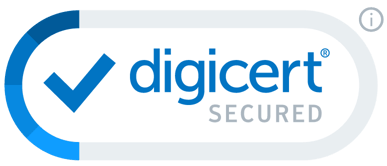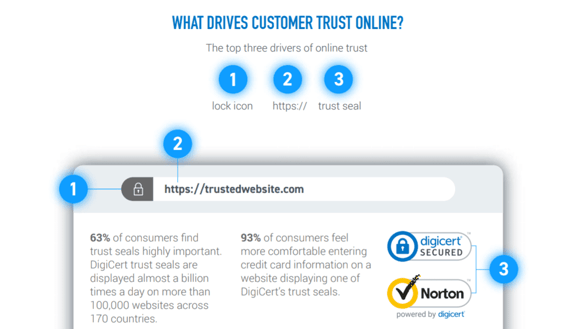
TL; DR: DigiCert is a leading provider of Transport Layer Security (TLS), Internet of Things (IoT), and Public Key Infrastructure (PKI) solutions used for encryption and identification. The company, known for its market-leading certificate management platform and security solutions, specializes in securing the enterprise and emerging markets around IoT, cloud, and DevOps. Ultimately, DigiCert’s goal is to drive better online trust through product innovation, superior customer service, and support for industry standards.
Google Chrome is the most popular browser available today, capturing 66% of the market share as of October 2020.
So when the company announced that, beginning in July 2018 with the release of Chrome 68, Chrome would mark all HTTP sites as “not secure,” online businesses, managed service providers (MSPs), and hosting companies took heed.
Since then, HTTPS encryption via the Secure Sockets Layer (SSL) protocol and its successor, Transport Layer Security (TLS), has become a top priority for online businesses. When enabling HTTPS on a site, Google recommends obtaining a robust TLS security certificate from a reliable certificate authority (CA) that offers technical support.

DigiCert helps online organizations manage security certificates.
With nearly two decades of experience delivering customer-centric identity and encryption solutions, DigiCert certainly fits the bill. The company’s goal is to simplify TLS implementations with its industry-leading certificate management platform and notoriously high-quality support.
But that’s not all — DigiCert also offers customer-centric solutions for securing the Internet of Things (IoT) and taking a holistic, scalable approach to public key infrastructure (PKI) management.
“DigiCert has always been focused on how to make TLS and PKI easy to manage for the customer and our partners, which involves listening to their input and adapting accordingly,” said Jeff Chandler, Director of Corporate Communications at DigiCert. “That strategy has helped us grow to become an industry leader and the largest commercial CA in the world.”
Moving forward, DigiCert will further its mission to help online businesses, MSPs, and hosting companies build online trust by raising the bar in terms of innovative product development, industry standards support, and the customer experience.
Years of Expertise in Identity and Encryption
Founder Ken Bretschneider started DigiCert in 2003.
“At the time, he had a firm where he managed websites for various companies,” Jeff told us. “He was looking to get an SSL certificate for a website and found that the process was very difficult as a customer. It was hard to obtain one, It was hard to get it validated, and he didn’t feel like he was getting a lot of customer care.”
Determined that he could do better, Ken started DigiCert. From the start, he focused on making SSL management a more customer-friendly process.
“Since its inception, DigiCert has been about taking care of the customer through a knowledgeable support staff that is available 24/7, is trained on the product, and can provide a solution without having to escalate issues to the managerial level,” Jeff said.
The strategy resulted in immediate organic growth. In 2017, the company acquired Symantec’s website security business and related PKI solutions.
“Since that time, we’ve been putting together the best of both companies, technology-wise, with products, solutions, and platforms that help companies manage their TLS certificates using the best global technology with a local touch,” Jeff said. “We have offices and support in every region and various countries around the world within their respective language and culture.”
While TLS management has become a must-have for businesses and resellers, such as MSPs and hosting companies, DigiCert also offers a number of additional customer-centric services and solutions designed to add value.
DigiCert CertCentral, for example, is an award-winning, enterprise-grade TLS management platform that simplifies the certificate life cycle by consolidating management tasks, including issuing, installing, inspecting, remediating, and renewing certificates.
DigiCert ONE, on the other hand, offers a holistic approach to PKI management via container-based design, allowing customers to enjoy rapid deployment, automated enrollment, and customizable workflows.
Helping to Accelerate Digital Transformation Securely
Digital transformation has been one of the industry’s biggest buzzwords for the past decade, and it’s easy to see why. The process, in which businesses drive change through the adoption of new technology, results in streamlined workflows and reduced manual work.

DigiCert makes it easy for online businesses, managed service providers (MSPs), and hosting companies to drive trust online.
Now, amid the COVID-19 pandemic, digital transformation has taken on a whole new meaning as leaders embrace technology that they were previously reluctant to use out of necessity. According to Statista, worldwide spending on technologies and services related to digital transformation increased by 10.4 percent in 2020, reaching 1.3 trillion U.S. dollars even in a time of economic constraint.
The folks at DigiCert have observed similar trends.
“The global pandemic that has forced a lot of companies to move to a remote workforce and accelerate digital transformation,” Jeff said. “What that means is that they have a number of connected applications, devices, users that all need to connect with the network in a secure fashion. All data needs to be encrypted, all devices authenticated, and all users authenticated.”
This has caused a surge in demand for TLS, IoT, and PKI solutions used for encryption and identification, Jeff said.
“For a traditional TLS in the web browser, this means companies have to scale their operations in a way that keeps up with demand,” he said. “They need to guarantee the uptime of their services, that they have a quick response from their Online Certificate Status Protocol (OCSP) and Certificate Revocation List (CRL) checks, when they’re checking across the internet for the validity of their certificates.”
Like those employed within DigitCert’s offerings, automated systems are key to surviving and thriving in this new environment. As of September 1, 2020, Apple, Google, and Mozilla began enforcing a one-year maximum for TLS certificate expiration, requiring even more management systems.
“They need to renew their certificates more regularly and manage them more closely,” Jeff said. “So what we’re really focused on is providing the automation and the smart tools that help them ensure they don’t have any expirations and ensure that they have everything properly configured. That way, TLS certificates don’t consume all of their time.”
Making PKI Easy for Customers and Partners
DigiCert’s overall goal is to make PKI and related processes easy and scalable to deploy and manage, said Leon Brown, Product Marketing, Management, Strategy, and Business Development at DigiCert.
“We started with making TLS easy to acquire and install, and we have now evolved to help customers do that at scale,” Leon said. “We have hosts who put TLS on all their sites and help customers along the journey to buying identity-rich certificates.”
Leon told us that, along with the TLS certificate, hosts are also interested in selling products to customers that cover website security fundamentals, such as malware scanning, vulnerability assessments, or PCI compliance for ecommerce.
“Those features are all available as parts of our offering and provide separate streams of revenue for hosting companies,” he said. People take different pieces of the puzzle based on their target audience. Ultimately, we have solutions that fit many different areas because PKI is really the uncommon denominator between everything.”
Leon said DigiCert is observing increased interest regarding how PKI can be leveraged to solve multiple security, identity, and access issues.
“Our use cases span multiple verticals, whether you’re making code secure for containers or embedding certificates at the time you’re programming silicon,” he said. “This is not your grandfather’s PKI. How it is being used today is revolutionary, affecting workloads that we hadn’t thought of two years ago. The scale, the deployment options, the ability to identify devices from birth through their entire life cycle to destruction — it’s an exciting area with so many uses.”
Standards for IoT and Other Emerging Technologies
Jeff told us that moving forward, DigiCert will continue to focus on the broad range of opportunities in the internet security space.
“We are involved in a number of areas and groups that are creating standards for some of these emerging technologies, like the IoT, quantum computing, and securing algorithms well into the future,” he said. “At the core of that is how PKI can be modernized to meet all of these needs.”
Leon agreed.
“We see PKI everywhere — we’re seeing people inject it through the supply chain, whether it’s at the programming level, in the factory, during deployment, and whether it’s dealing with the identity of the devices, encryption for communications, or secure code,” he said. “Being about to secure environments across locations at scale is what makes our jobs so interesting.”
HostingAdvice.com is a free online resource that offers valuable content and comparison services to users. To keep this resource 100% free, we receive compensation from many of the offers listed on the site. Along with key review factors, this compensation may impact how and where products appear across the site (including, for example, the order in which they appear). HostingAdvice.com does not include the entire universe of available offers. Editorial opinions expressed on the site are strictly our own and are not provided, endorsed, or approved by advertisers.
Our site is committed to publishing independent, accurate content guided by strict editorial guidelines. Before articles and reviews are published on our site, they undergo a thorough review process performed by a team of independent editors and subject-matter experts to ensure the content’s accuracy, timeliness, and impartiality. Our editorial team is separate and independent of our site’s advertisers, and the opinions they express on our site are their own. To read more about our team members and their editorial backgrounds, please visit our site’s About page.

